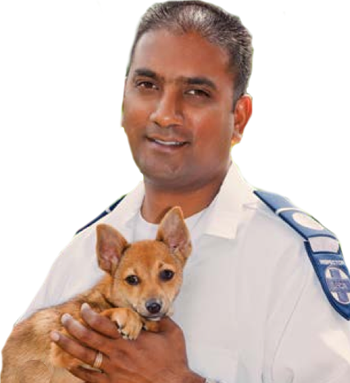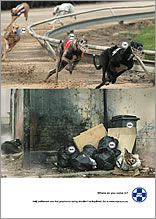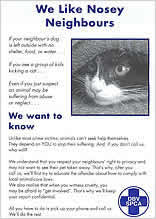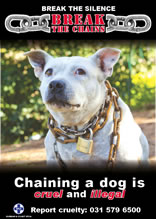We speak for them
In South Africa animals – including wild animals, farm animals, those used for medical research and entertainment, and reptiles and birds in captivity – are protected by law against cruelty and negligence. However, many still suffer as a result of human apathy, ignorance, greed and disregard.
Below are some of the major issues being tackled by the SPCA:
Dog chaining
Despite the fact that it is illegal to confine a dog permanently by chaining, the practice is rife in Durban. Many unfortunate dogs spend their entire existence at the end of a chain, usually fastened directly
around the neck. Being chained denies a dog every bit of natural behaviour, such as running, playing and exploring. It also has damaging psychological effects that can lead to aggression. In many cases,
chaining is accompanied by other forms of cruelty, for example denying food and water, shelter and veterinary treatment.
Our Inspectors regularly discover emaciated, mange-ridden and sometimes dead or dying dogs at the end of a chain. Neck injuries that have become necrotic (rotten) and riddled with maggots are also common.
Sometimes a chain is put around a young pup’s neck and not adjusted as the dog grows; it literally grows into the neck.
Members of the public are urged to report cruelty to us by phoning 031 579-6500. You can remain anonymous if you wish.
Exotic pets
The SPCA is opposed to wild birds and animals such as snakes, lizards, monkeys, hedgehogs, etc being kept or bred as pets. Confining these animals in cages, usually without access to others of their kind, is
cruel. Captive animals often die young as a result of being fed an incorrect diet or kept in an unsuitable habitat. Click here for more.
Poultry Industry
The poultry industry is one of the most wasteful and cruel intensive farming industries. Every year, millions of day old male chicks are tossed into trash bags to suffocate or thrown into macerators which
literally shred them alive. For the female chicks that escape this end, life is even worse. The majority of those destined to produce our eggs end up as 'battery' hens – squashed together in cages with the
space per bird equivalent to the size of an A4 sheet of paper.
Despite what you might believe, chickens are highly intelligent and social birds and this unnatural environment causes great distress. They are unable to stretch their wings, forage, preen or dust-bathe and
they never see the sun. Over-crowding can make them aggressive towards each other and they are often de-beaked (removing a third of the bird’s beak with a red-hot blade) to prevent injuries.
Broiler chickens (those farmed for their meat) are crammed into huge windowless sheds and pumped full of hormones to make them grow unnaturally quickly, so they can be slaughtered at 42 days. By that time, most
are so obese that they can no longer walk.
The intense confinement and overcrowding on factory farms results in unimaginable filth and disease. The chickens are forced to breathe ammonia and dust from feces and feathers all day long. Many suffer from chronic respiratory diseases or “ammonia burn,” a painful eye condition.
The SPCA opposes this type of factory farming and urges members of the public to help create change by buying only free-range or barn eggs and chickens. Free-range hens have access to sunlight and grass pastures. Barn hens live inside but are not kept in cages. They have more space to move around in, including raised perches.
Feral cats
It's easy to confuse a feral cat with a stray cat, but whereas stray cats can be rehomed, feral or free-roaming cats may never adapt to living as pets in close contact with people. These animals typically live
in a colony – a group of related cats – in a specific territory where food and shelter are available. Since feral cats typically avoid people, you may not even realise that they are living nearby.
These animals’ lives aren't easy without human caretakers. Females may become pregnant as young as five months of age and may have two to three litters a year. More than half of the kittens are likely to die without human intervention. Males who roam and fight to find mates and defend their territories may be injured and bites and scratches may become infected. Feral cats may cause a disturbance as a result of fighting and mating behavior, and be responsible for strong foul odours, flea infestations and the transmission of disease.
The SPCA endorses Trap-Neuter-Return (TNR) a strategy for improving the health and quality of life of feral cats and reducing their numbers. Feral cats who are TNRed are spayed or neutered so they can no longer reproduce, vaccinated against diseases, and surgically ear-tipped on one ear. Dedicated caretakers feed and provide shelter for the cats and monitor them for sickness. If you want to help feral cats, don't tempt them onto your property by leaving food out, as this could cause fighting between feral and domestic cats.
For more information on how to help feral cats, or to get help with feral cats, contact our Inspectorate on 031 5796500 or email info@spcadbn.org.za
Laboratory animals
Justification for animal testing and the results obtained are highly questionable both from a scientific and ethical perspective.
Again, we urge people to force an end to this practice by buying products that are not tested on animals and which do not contain animal substances.
As much as we would like to believe that no research should ever be done on animals, this state of affairs is unlikely to become an immediate reality.
We recognise that there will be a gradual transition period during which the role of the NSPCA will be to alleviate the suffering of laboratory animals.
Canned hunting
In South Africa, hunting of wild animals is deeply entrenched and plays a useful role in conservation – ensuring that populations of various species are kept at sustainable levels and providing funding for
critical conservation projects.
However, the recent death of Cecil the lion at the hands of a trophy hunter has highlighted the growing 'sport' of canned hunting.
Irrespective of the species hunted, this practice is regarded as unethical and the NSPCA requested Government to ban canned hunting in all its forms, as well as the breeding of any large predators for any other
reason than bona fide conservation projects. It was further proposed that any form of hunting that does not involve a free-living and self sustaining animal with a fair chase and chance of escape should be
considered canned.
Dog fighting
Although organised dog fighting is illegal in South Africa, there is a thriving underground movement – ranging from impromptu events in back alleys to carefully planned and organised fights with millions of
rands riding on the outcome. The SPCA is totally opposed to this cruel 'sport' where dogs used for fighting and as 'bait' suffer horrific injuries and death.
Your questions about pet care answered by our veterinarian
What vaccinations should my puppy or kitten receive and at what age?
Both puppies and kittens should be vaccinated at 6 weeks of age. Pups need rabies, distemper, measles and a canine parvo virus vaccine. This provides temporary immunity and the pup should be vaccinated again 3
weeks later against rabies, distemper, hepatitis, kennel cough, canine parvo virus and leptospirosis and thereafter every year. Kittens should have a simultaneous vaccination against snuffles, rabies and cat
‘flu at 6 weeks. These vaccinations require a booster 3 weeks later and should be repeated on an annual basis.
What should I feed my dog or cat?
Dogs and cats need a well-balanced diet that includes protein, carbohydrates, fatty acids, vitamins and minerals. Most commercial pet foods – both canned and dry – contain all the nutrients necessary for your
pet’s well-being. Dry foods also help to keep the teeth clean. The amount your dog needs varies according to size, breed, age, and level of activity – check the packaging for the manufacturer’s recommendations.
If in doubt, please consult your vet. Puppies and kittens particularly need careful feeding up until the age of about seven months. Cats can be very fussy eaters, so it’s a good idea to establish a regular
feeding area and provide them with clean bowls and water. An occasional special treat like a chew is very good for keeping your pet's gums and teeth healthy.
I heard you shouldn't give a dog chocolate. Is this true?
Dogs like the taste of chocolate and will gobble it up. But it is highly poisonous to both cats and dogs and may result in death. This is because the cocoa in chocolate contains theobromine which they are
unable to break down quickly. Cats are less prone to poisoning as they can’t taste the sweetness and are less likely to eat chocolate. Cooking chocolate is the most toxic, followed by dark and semi-sweet
chocolate, milk chocolate, and lastly white chocolate. Chocolate cake and chocolate icing are also extremely toxic as they contain cocoa. Pet owners may assume their dog is unaffected after eating large
quantities of chocolate as it can take several hours for symptoms to appear. Death can follow within 24 hours. If you suspect that your dog has eaten chocolate, take him directly to your vet.
Are there other ‘human’ foods that pets shouldn’t eat?
Onions, garlic, grapes and raisins are all poisonous to dogs and cats and can result in vomiting, diarrhoea, fever, pain, liver or kidney failure, coma and death. If you suspect your pet has eaten any of these
foods, take it directly to your vet. Other foods to avoid are raw fish (which may contain tapeworm and have high levels of the enzyme thiaminase, resulting in a Vitamin B1 deficiency), canned tuna and bones
(raw and cooked) which may cause choking or lacerations to/blockages of the gastrointestinal tract. Never offer your pet chicken or chop bones, as these are very brittle and shatter into sharp pieces. Do not
give your cat milk, as some cats are unable to digest the lactose in cow's milk, which may lead to diarrhoea.
My dog/cat is overweight. How do I solve this problem?
Excess weight is a result of overfeeding and too little exercise, and this can lead to heart disease, liver problems and arthritis. You will need to cut down on the amount of food or put your pet on a special
diet prescribed by your veterinarian. If you are feeding your pet correctly and it is still gaining weight, make sure it is not getting extra treats from your neighbours! Excessive weight gain may also be an
indication of a hormonal imbalance, in which case you need to visit your vet.
Is it really necessary to take my dog for walks outside of the yard? And if so, how long should the walk be?
For optimum health, it is essential that you exercise your dog for about 30 minutes daily. Most dogs get far less exercise than they need which often leads to destructive behaviour. Research suggests that dog
owners who regularly exercise their pets suffer less heart disease, so walking the dog is good for both you and your pet!
What grooming care does my dog need?
Apart from bathing, grooming such as brushing, nail clipping, ear, eye and teeth-cleaning, cutting/stripping the coat should be carried out regularly. Be sure to use a dog shampoo when bathing your dog as human
shampoos may contain irritants.
At what age is appropriate to begin training my dog?
Training to respond to commands should commence as soon as possible with short, daily lessons. Reinforce correct behaviour with praise and by rewarding with tasty treats! Never hit a dog as punishment for
failing to obey - rather withhold the reward to show your dissatisfaction. When issuing commands, use short words in a clear, precise tone of voice. Never vary these command words but do try to make the lessons
fun for both of you!
How do I house-train my kitten?
You can teach a kitten as young as four weeks old to use a litter tray by immediately placing it in a litter tray as it begins to crouch. If a kitten relieves itself outside of the tray do not rub its nose in
the mess - the odour will tell the kitten that this is its toilet and it will return to it.
How do I stop my cat from ripping up my furniture?
Provide scratching posts to stop kitty from ruining your furniture by scratching it. If your cat is allowed outdoors it will probably find a piece of bark on which to sharpen its claws, otherwise a vertical
post covered in carpeting is ideal.
What Is sterilisation?
Sterilisation refers to the surgical removal of the reproductive organs – the ovaries and uterus in the female (called spaying) and the testicles in the male (called neutering). These procedures are performed
at around six months of age.
Isn't it unfair to sterilise my pet?
Not at all - your pet is likely to be more relaxed, easier to train and less aggressive if it is not being driven by the strong urge to find a mate. Sterilisation also eliminates or reduces sexually-related
behaviour such as spraying urine to mark their territory, straying to seek sexual partners, fighting and howling. There are also long-term health benefits for sterilised animals. Spayed females have a far lower
incidence of mammary cancer, and pyometra (a serious, even life-threatening infection of the uterus) and ovarian cancers are completely eliminated. Testicular cancer in males is also eliminated. If all this is
not enough to make you take your pet straight to the vet for sterilisation, consider this: In just 6 years, one female and her offspring can produce 67 000 dogs – only a quarter of which will find permanent
loving homes. The rest are euthanased.
Won't my pet get fat after spaying?
Only too much food combined with too little exercise will make your pet fat. Remember most pets are sterilised near the end of their period of rapid growth when food intake needs are levelling off. If dogs are
fed as though they are pups they will probably get fat regardless of whether they are spayed or neutered.
I've heard a dog should have a litter or at least come into season before being spayed.
There is no valid reason, medical or other, for doing so. If you allow your pet to have a litter you may be able to find homes for all the puppies or kittens - but you have no control over what happens to them
or their future litters. Every year, the SPCA is forced to euthanise hundreds of healthy dogs and cats because there simply are not enough homes for them.
Why does the Durban & Coast SPCA not catch dogs on freeways?
This is the jurisdiction of Metro Police, who should be contacted on 031 361-0000. It is imperative that Metro Police are present as traffic usually has to be redirected. The SPCA will assist where possible.
How long does the Durban & Coast SPCA keep stray animals for?
Healthy animals are sheltered in the stray section for a 7 day period during which time the rightful owner has the opportunity to claim their pet. If the pet has not been claimed after this period, it will be
transferred to the adoption section, where it may remain for weeks or even months. This will depend on the animal’s age, personality and the amount of space available.
What can be done about feral cats?
Traps can be hired from the Durban & Coast SPCA. Contact 031 579-6505 for more information. Cats and kittens may be brought to us for possible re-homing or to be sterilised and returned to the area in which
they were found.
Can the Durban & Coast SPCA help with the problem of barking dogs?
No. This is the responsibility of Metro Police, as it is against municipal by-laws. Contact 031 361-0000.
How much does it cost to spay/neuter cats and dogs at the Durban & Coast SPCA?
You need to qualify to use the services of the Durban & Coast SPCA Animal Hospital (see below). A dog spay costs R770; dog neuter R530. A cat spay costs R560; a cat neuter R420. These prices are subject to
change.
Do I qualify to use the SPCA clinic and hospital?
Unemployed and pensioned pet owners automatically qualify. Salaried pet owners are asked to fill in an income declaration form in order to determine if they earn enough to utilise the services of a private vet.
Contact the Animal Hospital to see if you qualify: 031 579-6547.
Subscribe to our newsletter
Recent Posts
-
Taking animal care to where it's needed most
On 9 October The Durban & Coast SPCA conducted a successful community outreach service in Ntuzuma, made possible by a special sponsorship and the collaboration of local community leaders. Posted 2025-10-17 05:51:07
-
Storm goes home
After being missing for over a year, this Lab cross is finally reunited with his owner Posted 2025-10-15 06:23:50
-
Woolworths MyDifference replaces MySchool � with added benefits to you!
Did you know that MySchool � South Africa�s popular charity beneficiary programme � is being phased out? After 31 December 2025, both MySchool and WRewards cards will no longer work. Posted 2025-10-10 05:39:03
-
Share the joy of these happy tails!
Don�t you just love seeing animals that were lost, abandoned or unwanted finding love again? Posted 2025-10-10 05:32:39
-
When Compassion Doesn�t Sleep
On Friday, 16 August, 16 dedicated supporters braved the rain, mosquitos, and a sleepless night as they took part in our annual SPCA Sleepover in honour of International Homeless Animals Day. Posted 2025-09-22 13:39:21
How you can get involved
If you love animals, please support our efforts to protect them from cruelty and neglect. There are lots of different ways to help.
Sponsor a Yard Cat
Provide care and shelter for one of the cats that live permanently at our SPCA because they cannot be re-homed – with your monthly sponsorship gift of just R200.
Volunteer
Volunteering is an enriching experience for anyone who has some free time on a regular basis and wants to make a difference. You need to be over 16 years of age, reliable and have your own transport.
Join the new Woolworths MyDifference programme
The old MySchool and WR Rewards cards will be discontined soon. But you can still help animals everytime you shop at Woolworths, by getting the new MyDifference App and selecting the Durban & Coast SPCA as your cause. Download the app from the Apple store or Google play now, or click the button to find out more.
Support Coffee Cats
Enjoy a cuppa or a light meal in the tranquil setting of our cafe and tea garden. Meet our famous yard cats, browse plants for sale, visit our charity shop or Adoption Centre.
Include us in your Will
If kindness towards animals has been one of the guiding principles of your life, wouldn’t you enjoy knowing that your voice against cruelty, neglect, greed and ignorance will continue to be heard beyond your lifetime?
Donate unwanted items
Your unwanted furniture, clothing, household appliances, books, jewellery, etc can be sold in our charity shop to raise funds towards the care of our furry orphans. We also appreciate gifts of pet food, blankets, etc.
Shop til you drop
We have a charity shop filled with amazing bargains, as well as a section of brand new pet products – collars & leads, tick & flea remedies, grooming products, toys & pet food.
Buy plants
Fill your garden with beautiful healthy plants, seedlings, flowers and more. Large selection available at our nursery, adjacent to Coffee Cats.
Sponsor a kennel
When you sponsor a kennel at the SPCA at a cost of R200 monthly, your kindness doesn't only touch one dog. Hundreds of sad, hurting and frightened dogs will find sanctuary in 'your' kennel, while they wait to be adopted.
Report cruelty
Animals can't speak for themselves - they need compassionate people to speak for them. If you know of an animal that is being ill treated or neglected, call us on 031 579 6501 or our emergency after hours number, 083 212 6103.
Amanzimtoti: 031 904 2424/5
Dolphin Coast (Ballito): 087 550 0512 /083 653 0127 (Emergencies)
Dundee & District: 034 212 2851
Empangeni: 034 792 9129/078 306 1439 (Emergencies)
Eshowe: 035 474 4169
Estcourt: 36 352 1476/083 555 9758 (Emergencies)
Greytown: 033 413 1181/033 413 1522
Howick: 033 330 4557/033 330 2672
Kloof & Highway: 031 764 1212

Kokstad: 082 771 7229
Lower South Coast: 039 312 0962
Mooi River & District: 033 263 1526
Newcastle: 034 318 2346
Phoenix (Avonford Crescent) : 031 500 6452
Pietermaritzburg: 033 386 9267/8/9
Richards Bay: 035 753 2086
Sani: 033 702 1884

We have three Charity Shops offering all sorts of wonderful bargains.
Springfield Park: The Charity Shop at our premises in Springfield Park (cnr Inanda Road and Willowfield Cresecent)Open Monday to Friday 8am-3.30pm Saturday 8am-12.30pm
Tel. 031 579 6552 for more information.
Sunningdale Centre: Permanent shop at Sunningdale Centre (Corner Village Way and Umhlanga Rocks Drive) We’re located on the upper level - shop 202 above Waxys/Fabrica.
Visit us Monday to Friday 9am-5pm Saturday 9am-3pm Sunday 10am-2pm Public Holidays 9am-1pm
Ballito: The Dog Box at the Balvista Centre, 22 Sandra Road, Ballito
Open Monday to Friday 10am-4pm Saturday 9am-12pm
Browse through second hand books, clothing, furniture, household appliances, paintings and bric-a-brac for special treasures at low prices.
You'll also find a comprehensive selection of top quality pet products at The Charity Shop at our premises in Springfield Park – from dog food and bowls to leashes, collars, beds, toys and tick and flea remedies.
Volunteer Application Form


Meet for divine cappuccinos, lattes or espresso at our relaxed open air coffee shop.
Open from 8am-4pm Mondays to Fridays and from 8am-1pm on Saturdays.Great value breakfasts, burgers, sandwiches and light meals – plus delicious pies, cakes, muffins and other treats. Be sure to ask about our daily specials!
Call Mark on 031 579 4553 for deliveries in the Springfield area.
Speak for animals who can't speak for themselves – donate by Master/Visa card, EFT or Mobicred
Adoption enquiry form
Events

During the year, we run a series of fun events. Follow the links below for more information.
East Coast Radio House & Garden Show: July
Homeless Animals Day Kennel Sleepout: August
Paws for the Camera calendar competition: August/September
Ladies Spring Breakfast: September
Annual Golf Day: November
Market Day at the SPCA: Usually the last Saturday of the month

Visit our plant nursery for beautiful seedlings, shrubs and trees.
Browse our selection of lush healthy plants available to you at very reasonable rates. Best of all, a percentage of the proceeds goes towards the cost of caring for animals at the SPCA.Open Monday to Friday
Saturday 8am-12.30pm
Tel. 031 579 6552 for more information.
Report cruelty
Help us stock our Charity Shop and Bargain Hunt
We are always in need of good second hand clothing, jewellery, household appliances, furniture, books, toys, etc
Please drop off unwanted items at our SPCA in Springfield Park. Instead of cluttering your cupboards, they can be turned into cash to help care for animals in need. We also appreciate donations of pet blankets and dry or canned dog and cat food.If your donation is large, please call us on 031 579 6534 to arrange for collection.
Boarding Kennels Booking Form
Sponsor online by credit card or Instant EFT
Enter online now
Sponsor a kennel
Get a collection tin
Submit your tribute
Enter online now
Join our mailing list
SPONSORSHIP










